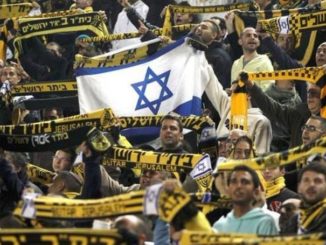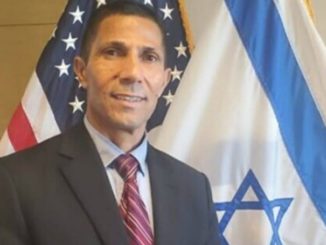
By Ramzy Baroud 
Another football ‘controversy’ has started when football players participating in the ongoing ‘UEFA Euro 2020’, kneeled down during national anthems to protest racism, a serious problem that has plagued football stadiums for many years.
Yet, while some players chose to kneel down, others opted not to, offering flimsy excuses as “players weren’t ready”, and “politics should stay out of football”. Racism in sports is real, though it cannot be separated from racism within society. In fact, the reactions to the moral stances taken by some players were reflections of how rightwing, populist and chauvinistic movements wield such massive influence over various European societies, to the extent that these movements often define mainstream political sensibilities.
For example, the French national team, comprising largely black and Muslim French players, came under attack led by rightwing politicians and media outlets to the point that, on June 15, the entire team decided not to take a knee at the start of their matches, likely fearing racist repercussions.
In the French example, racism in sports prevailed over the anti-racism sentiments. Worse, the country’s highest football association, the French Football Federation (FFF) does not even acknowledge the necessity to discuss the issue. FFF president, Noel Le Graet, was quoted as saying that racism “does not exist”, following an incident last September during the Marseille-Paris Saint Germain game, when the Brazilian Neymar was called a ‘monkey motherf—er’ during a scuffle.
Not only are racist incidents in football games on the rise and well-documented in France and elsewhere, the ‘monkey’ slur is particularly popular among European football fans who, sometimes in groups, carry out what is known as ‘monkey chanting’, which specifically target black and other dark skin players. When the despicable practice in Italy finally received national attention, an Italian court dismissed the case as ‘unfounded’, and fans who were caught ‘monkey chanting’ on camera were ‘unconditionally acquitted.’
This in mind, it was unfortunate that only half of the Italian team took a knee during their game against Wales on June 20, and eventually, they decided not to kneel down at all in a later game. It is telling that, while racism in sports continues to prevail, anti-racist gestures are considered unnecessary and divisive.
The truth is that football, like any other sport, is a reflection of our societies, our unities and divisions, our economic privileges and socio-economic inequalities, our strong communal bonds and, yes, our racism. Instead of attempting to fully understand and, when necessary, alter these relationships, some conveniently opt to ignore them altogether.
Assertions such as ‘sports and politics must not mix’ are not only wishful thinking – as they ignore the fundamental premise that sports are a direct expression of reality – they are also underhanded as they are meant to divert attention from core issues that should concern everyone.
This misleading logic falls within the same category of the phrase “all lives matter” in response to the legitimate outcry for racial justice under the banner, “black lives matter”. The latter is meant to illustrate – in fact, challenge – racism and violence, which disproportionately target black people in the United States specifically because of their skin color; while the former, although technically accurate, is meant to delude and undermine the urgency of confronting systemic racism.
When American football player, Colin Kaepernick, kneeled down in 2016 to protest racial injustice, he did mean to be disruptive, not to ‘disgrace’ American ‘values’ and ‘symbols’, but to force millions of people out of their comfort zone to contend with far more consequential questions than winning or losing a football match. His statement was an act of protest against the mistreatment of black communities across the US. As a black man with access to media platforms, it was his moral duty to speak out. He did. But that wholly symbolic, non-violent act was perceived by many in government, media and society as a treasonous one, which ultimately cost the athlete his career.
The entire episode, which reverberated across the world and the violent, often racist, responses to it were all political, unwittingly proving, once more, that the relationship between politics and human rights, on the one hand, and sports, on the other, are impossible to separate. Interestingly, those who insisted that Kaepernick has violated the sanctity of sports have no qualms with other, essentially political acts throughout football: the national anthem, the endless display of flags, the nationalist chants, of soldiers being honored for their services in various wars and, at times, of air force fighting jets flying overhead, intoxicating the crowds with the might and power of the US military. Why are nationalistic politics acceptable while a single black man kneeling down to shed light on the plight of the innocent victims of police brutality is perceived to be an act of treason?
Whether it is convenient or not, sports is rife with political symbols and is a reflection of existing realities: inequalities, racism and more. It can also be a source of harmony and unity. In fact, sometimes it is, as was the heartwarming exchange between Portuguese international player, Cristiano Ronaldo, and Iranian footballer, Ali Daei, when, on June 24, Ronaldo equalized the international goal record of Daei. It can also be a reflection of rooted socio-political ailments, such as racism.
Racism is a political disease, like cancerous cells spreading across the body, or body politic of society. It has to be stopped, on and off the field. While taking the knee will not end racism, it is meant to serve as a conversation starter, a moral stance by players and a meaningful gesture of camaraderie and humanity.
– Ramzy Baroud is a journalist and the Editor of The Palestine Chronicle. He is the author of five books. His latest is “These Chains Will Be Broken: Palestinian Stories of Struggle and Defiance in Israeli Prisons” (Clarity Press). Dr. Baroud is a Non-resident Senior Research Fellow at the Center for Islam and Global Affairs (CIGA) and also at the Afro-Middle East Center (AMEC). His website is www.ramzybaroud.net

– Ramzy Baroud is a journalist and the Editor of The Palestine Chronicle. He is the author of six books. His latest book, co-edited with Ilan Pappé, is “Our Vision for Liberation: Engaged Palestinian Leaders and Intellectuals Speak out”. Dr. Baroud is a Non-resident Senior Research Fellow at the Center for Islam and Global Affairs (CIGA). His website is www.ramzybaroud.net







